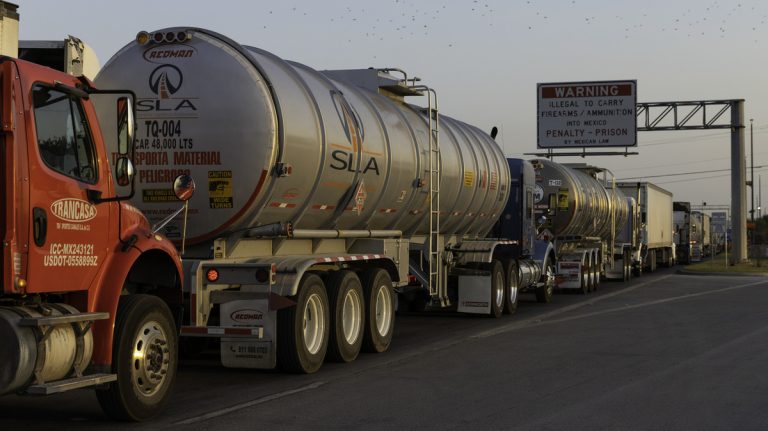🎧 Listen to This Article
In a significant disruption to energy trade, fuel imports from Texas to Mexico have effectively ground to a halt, leaving tanker trucks waiting at the border for over two weeks. This disruption stems from the Mexican government’s increased inspections and scrutiny of imported fuel, aimed at curbing illegal fuel trafficking and ensuring correct tax payments. This crackdown, part of President Claudia Sheinbaum’s broader strategy to combat fuel theft and fraud, has brought both short-term and long-term consequences for energy markets and trade relations between the US and Mexico.
The Crux of the Problem
Mexico’s fuel imports from the United States are substantial, with 1.15 million barrels of petroleum products entering the country daily in January 2025. Of this, 470,000 barrels per day were motor gasoline, while 237,000 barrels were diesel. These imports play a crucial role in Mexico’s fuel supply, especially as domestic production by Petroleos Mexicanos (Pemex), the state-owned oil giant, has been unable to meet the demand. However, Mexico’s efforts to crack down on fuel importers involved in tax evasion and illegal shipments are creating significant bottlenecks, primarily at the Texas-Mexico land crossing.
The situation has been exacerbated by an uptick in border inspections, focusing on fuel shipments potentially tied to fraudulent or falsified paperwork, which has led to delays and disruptions in cross-border trade. As a result, distributors report a dramatic drop in demand for their services, with some businesses seeing their fuel transportation routes to the border shut down overnight.
The Financial Impact: A Ripple Effect
From a broader economic perspective, the halt in fuel imports carries significant implications for both the United States and Mexico. For the US, the border blockage could lead to increased domestic fuel inventories, possibly causing a surge in supply that drives down prices for US-based oil companies. However, this could also strain logistics networks and increase the cost of transportation for fuel distributors, especially those that rely on this trade to Mexico for steady revenue streams.
For Mexico, the most immediate consequence is the potential for increased fuel costs at local gas stations. While the Mexican government controls fuel prices under a six-month agreement that began in February 2025, rising import costs due to border delays may put pressure on these controls. Additionally, this could create challenges for local transporters who may face fuel shortages or higher operational costs in the short term.
However, the true cost of this situation is borne by Pemex, which is already dealing with billions of dollars in losses from fuel theft and illegal imports. In fact, Pemex’s struggle to stop fuel theft cost the company at least $263 million in the third quarter of 2024 alone, more than double the losses from the same period the year prior. Given these statistics, President Sheinbaum’s administration is prioritizing the enforcement of tighter controls on the fuel import sector, with the aim of recovering lost tax revenue and diminishing the impact of organized crime in the sector.
Navigating Trade Relations and Economic Reforms
The longer-term effects of this crackdown will ripple across several sectors. Mexico’s energy policy will likely evolve to incorporate more stringent checks on both imports and domestic fuel production. With trade relations between the US and Mexico already strained—particularly under the backdrop of tariff disputes and political tensions—this fuel import standoff could escalate tensions further. If not addressed, it could create friction between key allies in the North American energy market.
Moreover, this regulatory shift could reshape Mexico’s domestic fuel landscape. Increased border scrutiny could push Mexican importers to seek alternative routes or suppliers, potentially diversifying Mexico’s sources of fuel and reducing its dependence on the US. On the other hand, if the current regulatory environment is seen as too disruptive, it could discourage investment in Mexico’s energy sector, further burdening Pemex’s finances and stalling any efforts for modernization.
From a policy perspective, the Mexican government will need to carefully balance the enforcement of tax compliance and anti-smuggling measures with the practical needs of its fuel importation sector. The authorities could explore solutions like improving transparency in the fuel supply chain and implementing more efficient and less disruptive inspections.
What Should Be Done?
For businesses, the immediate recommendation is to stay informed on the developments at the border and anticipate potential delays in fuel deliveries. Fuel distributors operating in or near the Texas-Mexico border should evaluate their logistics chains and consider diversifying supply routes where feasible to mitigate risks of further disruptions.
Additionally, businesses involved in fuel imports should prioritize ensuring their paperwork and tax documentation is compliant with Mexican regulations to avoid the suspension of import permits, as seen with Valero Energy Corp. Companies may also consider consulting with tax and legal experts familiar with Mexican energy law to ensure full compliance as the government continues to ramp up enforcement.
For policymakers in both Mexico and the US, a more collaborative approach to energy trade could help alleviate tensions. By working together on cross-border fuel regulations, both nations can ensure a more stable and transparent energy market that benefits both sides economically while reducing the illicit trade of fuel.
Mexico’s halting of fuel imports at the Texas border is a microcosm of broader challenges facing the energy sector. With rising enforcement of fuel import regulations and the continuing battle against illegal fuel trade, the situation highlights the need for a careful recalibration of cross-border trade policies. The actions taken now could shape the future of the US-Mexico energy relationship for years to come.
For further details, clarification, contributions, or any concerns regarding this article, please contact us at editorial@tax.news. We value your feedback and are committed to providing accurate and timely information. Please note that our privacy policy will handle all inquiries



